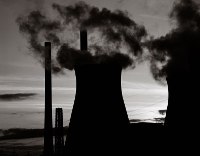Greenhouse gas emissions in 15 Western European Union members drop
Greenhouse gas emissions in the 15 Western European Union members dropped by 0.8 percent between 2004 and 2005.

Germany, Finland and the Netherlands led the charge in reducing carbon emissions by cutting their reliance on coal and other fossil fuels for producing electricity and heating, the European Environment Agency said in a preliminary report.
Germany cut its greenhouse gases by 2.3 percent in 2005, said Andreas Barkman, head of the EEA's greenhouse gas emission group.
"That means quite a lot in absolute amounts, because Germany, in essence, has almost a quarter of EU emissions," he said.
Jacqueline McGlade, the EEA's executive director, said the drop was a positive signal but not necessarily an indication that emissions will continue to decrease.
"It represents a decrease over only one year and may not be representative of the trend over a longer period," she said.
The EU-15 countries have pledged to reduce their greenhouse gas emissions by 8 percent by 2012 under the Kyoto Protocol. So far, emissions in those countries have decreased 1.9 percent since 1990, the EEA report said. For all 27 EU countries, emissions have decreased by 8 percent since 1990, the report said.
Barkman said several countries still have a lot of improvements to make, including Spain, where emissions rose by 3.6 percent in 2005.
"Spain has by far seen the largest increase in 2004 to 2005," he said.
The report was submitted to the United Nations Framework Convention on Climate Change on April 14. The figures will be rechecked by the U.N. and EEA before the final report is published in June.
The report is more detailed on the 15 old EU members because these countries were covered by the 'EU burden-sharing agreement' under the 1997 Kyoto Protocol.
Under EU rules, the 12 new, mostly eastern European states, do not have to meet that target.
Subscribe to Pravda.Ru Telegram channel, Facebook, RSS!


